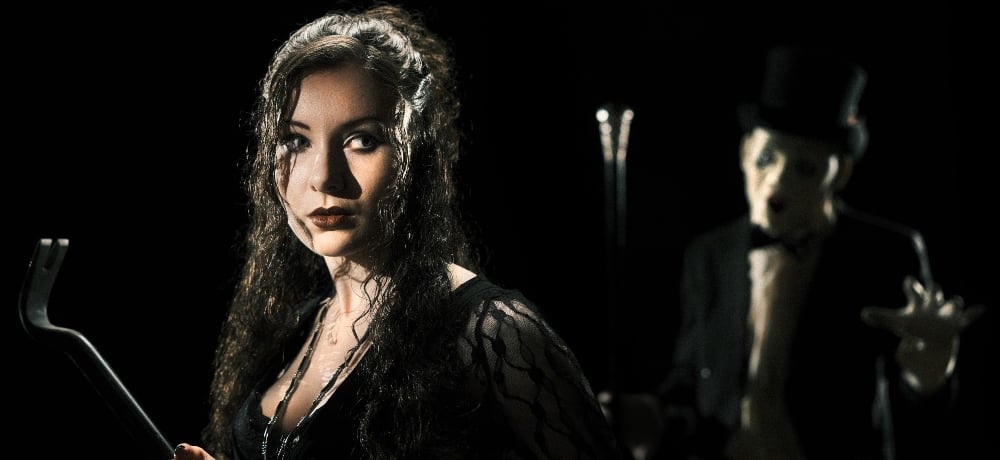





AMC continues their "Dispatches from the Set" series of interviews with production designer Greg Melton, talking about creating a devastated highway and Hershel's farm for the new season.
The start of the second season of The Walking Dead is less than 3 weeks away, with the 90-minute first episode premiering on October 16th.
"Q: In Season 1, you created a devastated downtown Atlanta. For Season 2, you got a stretch of devastated highway. How did they compare?
A: They were pretty similar, actually as far as getting them organized, and doing your homework and getting the blocking and positioning of things that need to happen as the scene unfolds. We got really great cooperation down here from the Georgia Department of Transportation to shut down a big four-lane highway, which was the biggest thing -- we needed something major. Once we had that, it was just a matter of trying to figure out how many cars would tell the story. I think at one point, on our biggest day, we put almost 200 vehicles into that set, which was over a quarter of a mile long.
Q: And then you have to dress each of the vehicles...
A: Exactly. It's all people who are fleeing, so they're filled with bags and lots of stuff. And then it's been sitting there for weeks, so we have to come through and do a real heavy aging pass on everything. And then we trashed the highway. Literally. We were dumping bags and bags of trash and things. Everywhere you could see. We created two or three wrecks with burnt grass in the median. I love doing sets like that because you just stand out there and you start putting things around. There are only so many floor plans you can do. And then you gotta stand there in that space and just make it happen.
Q: What's been the biggest challenge in Season 2?
A: The biggest challenge was to find the perfect farm. Ever since the end of the first season, everybody's like "The Farm!" And I couldn't even think about it: Are we gonna build it? Are we gonna find something? Are we gonna find half of something and build the other half? It really all takes place here. Having said that, once we got it, there were still things we had to work into it like building the barn and then putting a position in for the camp for everyone to hang out. So between the house and the barn and the camp we created this nice sort of triangle of action and story.
Q: Did any work have to go into dressing the house, or are you shooting it as-is?
A: The exterior of the house, for the most part, we're shooting as is. We ended up basically emptying the entire inside of the house and redressing it for our needs as Hershel's farmhouse. But the exterior of the house was perfect the way it was.
Q: Cinematographer David Boyd told us you designed the barn to look alive. What was the inspiration for that?
A: Initially there was some talk about maybe burning the barn, so I was real interested in giving the barn a kind of face. So it kind of had a personality and if we were going to do the burn it would be very dramatic to see this screaming face down in the meadow. But the approach, it's much like with the house -- the house at first glance is just sort of this beautiful setting and it's a lovely farmhouse. And then at times, there are certain ways you can shoot it, or find an angle and it can look very disturbing and menacing. And I wanted the barn to have the same feeling. Like, "Oh isn't that a lovely barn sitting out in the pasture," and then to find that way to tilt it into that sort of horror -- it's an ominous, dreadful place.
Q: The barn looks like it's been there 100 years, but is actually brand new. How did you achieve that look?
A: We actually bought an old roof off of a barn down here in Georgia and we got this beautifully aged and rusted tin roof that's been around for 80, 90 years. That aspect of it is old, but everything else is new. It's literally delivered brand new wood, and then we just did our aging passes with it. I wanted it to not be too dark because we're going to have nighttime work around it, so I kind of skewed it towards a more greyed out, washed out so it would catch moonlight.
Q: Having dressed all these sets, do you know what you'd do in the event of an apocalypse?
A: Yeah. It's interesting because as you go through this show you realize there's really nowhere to run. That's one thing I've learned about this apocalypse. And so I think I would probably hunker down in my own house and fortify it and try to ride it out. It's not like there's a hurricane coming that's gonna destroy the house. It's just, can you defend it? You might as well just stay put and protect yourself. Kind of the way Morgan did in the Pilot. He fortified the house and was able to live there and stay quiet. There's something to be said for that in a zombie apocalypse. [Laughs] Be quiet."